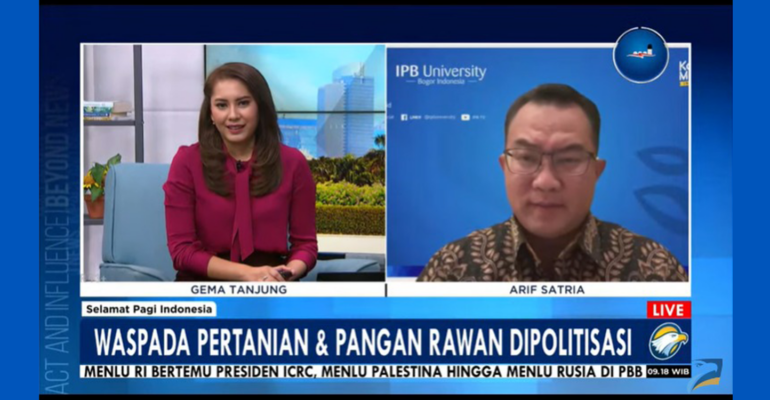The Rector of IPB University Reveals Solutions for a Sustainable Food Supply

Rector of IPB University, Prof Arif Satria, revealed sustainable food solutions in the Selamat Pagi Indonesia Program on Metro TV on Wednesday, 24/1. He advised the government that in a project, objective facts and academic research are important to be used as a reference.
“Currently, food issues have become a political debate, depending on which perspective you want to see, but there are many things that must be considered in a project, such as a food estate that must have a comprehensive study,” said Prof Arif.
The Rector of IPB University also said that the issue of food fulfillment has entered the world. He revealed data on land requirements to meet world food needs until 2030.
“In an effort to meet the world’s food needs in 2030, the current world land needs reach 5.4 billion hectares, but there are only 5.1 billion hectares of land left, so 300 million hectares are still needed. Therefore, this issue must be resolved by all countries in the world,” said the chairman of the Indonesian Muslim Scholars Association (ICMI).
He continued that the results of research by IPB university researchers related to land conversion in Indonesia in the period 2012–2019 decreased by around one million hectares, so it is important to uphold the Basic Law (UUD) for the protection of sustainable food land. “To be able to enforce the Constitution, all parties must implement it with a strong political commitment,” said Prof Arif.
Prof Arif also reviewed solutions so that farmers can be more prosperous. “There must be a balance between high productivity, good prices, and efficient production to make farmers more prosperous,” he said.
Meanwhile, for solutions to meet the needs in the midst of many challenges such as El Niño, land conversion, and productivity, Prof Arif mentioned two important things: assistance in planting superior varieties and the importance of utilizing post-harvest technology in order to minimize food loss.
“The results of the food loss study conducted by IPB University prove that food wasted due to scattered grain can reach 11 percent,” he explained. (dh/Lp) (IAAS/Aly)


